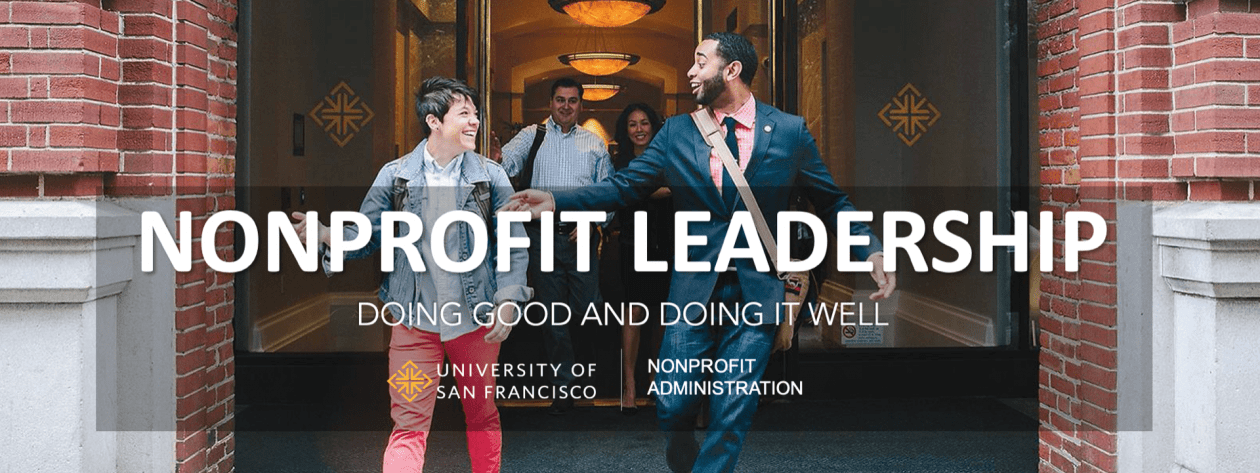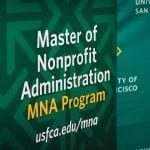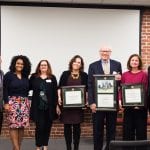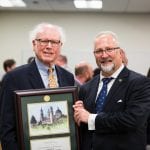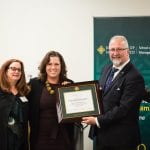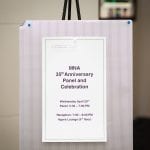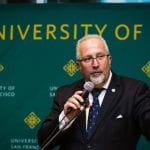
In 2018 the Master of Nonprofit Administration (MNA Program) at University of San Francisco celebrated its 35 years of existence since its foundation in 1983 by Dr. Michael O’Neill. The 35th MNA Anniversary Celebration of April 25th featured a panel reflecting on the accomplishments and challenges of nonprofit management education in the 21st Century. This video shares some of the highlights of the events and the valued reflections provided provided by our alumni Jeanne Bell (MNA ’01) and Alexa Cortez Culwell (MNA ’95).
The following are Dr. Marco Tavanti’s opening remarks to the April 25th Anniversary Celebrations
Thank you and welcome to this Panel Discussion and Celebration of the Master of Nonprofit Administration Program Celebration of its 35 Years of Excellence and Social Innovation. We are honored today to have a panel of experts – that will introduce shortly — and that will help us to understand some of the main challenge and opportunities in nonprofit education, community responsibility and capacity development. After an award ceremony we will continue our networking celebrations upstairs in the 5th floor AGORA where you can meet MNA alumni, friends and students while also viewing MNA Capstone Posters samples and Infographics from the annual Academic Global Immersion Program on Refugee. In the meantime (and to earn your drinks) you should also respond to the survey in front of you. On the table you can also find a card where you can formulate a question you may have for the panelists.
The Ignatian Pedagogical Paradigm, is a Jesuit method for teaching and learning embedded in our current MNA degree. It starts with observing the reality (seen it also through immersions and experiential learning), followed by the analysis (often through multidisciplinary perspectives and mixed methodologies to understand complex and unjust realities of marginalization), and the action into making the world a better place such as the USF slogan (Change the World from Here…). What was known in Latin America as VER, JULGAR, ACTUAR, has been integrated by impact evaluation and contextualization into our local/global and diverse communities. More recently this method included a new dimension CELEBRAR, to celebrate our accomplishments. Our celebration of the 35th anniversary of the MNA program reflects all these paradigms and invites us to take time to pause, observe, reflect, a celebrate the past and future of nonprofit management education.
In 1983, Dr. Michael O’Neill had the pioneering vision of designing a graduate degree to develop managerial and leadership capacity for nonprofit professionals. The MNA Program was accompanied by the research activities of the Institute for Nonprofit Organization Management (INOM) which followed other academic innovations such as the establishment of Nonprofit Academic Center Council (NACC) in 1981 and the creation of the Association of Voluntary Action Scholars later renamed as Association for Research on Nonprofit Organizations and Voluntary Action (ARNOVA) in 1971. Dr. Michael O’Neill is known as the father of nonprofit management education (NME) that emerged as a field of study through these and other pioneering activities in which he was deeply involved.
While Dr. Michael O’Neill worked on developing the field of NME in the West Coast University of San Francisco, one of his colleague in the East Coast, Prof. Lester Salamon at the Washington DC Urban Institute (now at John Hopkins University) contributed to understand the scope and structure of the nonprofit sector. Today, nonprofit/nongovernmental/charities/philanthropic and voluntary institutions are major forces for good contributing to almost 6% of the American economy and 1/6 of the labor force in California. Internationally, the third sector institutions include a wider spectrum of organizations including hybrid social enterprises and social innovations solutions for the emerging world social economy. Our MNA students know about these developments and also know that both social and economic impact needs to be equally considered and measured to understand the true value of the sector.
In the last 35 years, the Program has generated 612 alumni in key leadership positions and influential roles for the advancement of the capacity, impact and sustainability of the sector. We are honored today to have with us two of these MNA alumni, Alexa Cortes Culwell (MNA 95), Co-Founder of Open Impact and author of The Giving Code and the Giving Journey and Jeanne Bell (MNA ’01) who served until recently as CEO at Compass Point and now at Nonprofit Quarterly and in our MNA Advisory Board. Jeanne is also a well-known author of Nonprofit Sustainability other publications for the promotion of social impact with sustainable business practices among NPOs.
We are excited to engage in a panel conversation with Michael, Alexa and Jeanne on the past, present and future of nonprofits, its education and its capacity needs for effective leaders and organizations. Who can better represent our voice than one of our current MNA students, Sascha Rosemond (MNA ’19), who currently serves as Development and Donor Relations Assistant at the San Francisco Foundation.
Please join me to welcome Sasha, with Jeanne, Alexa and Michael to these conversations.
